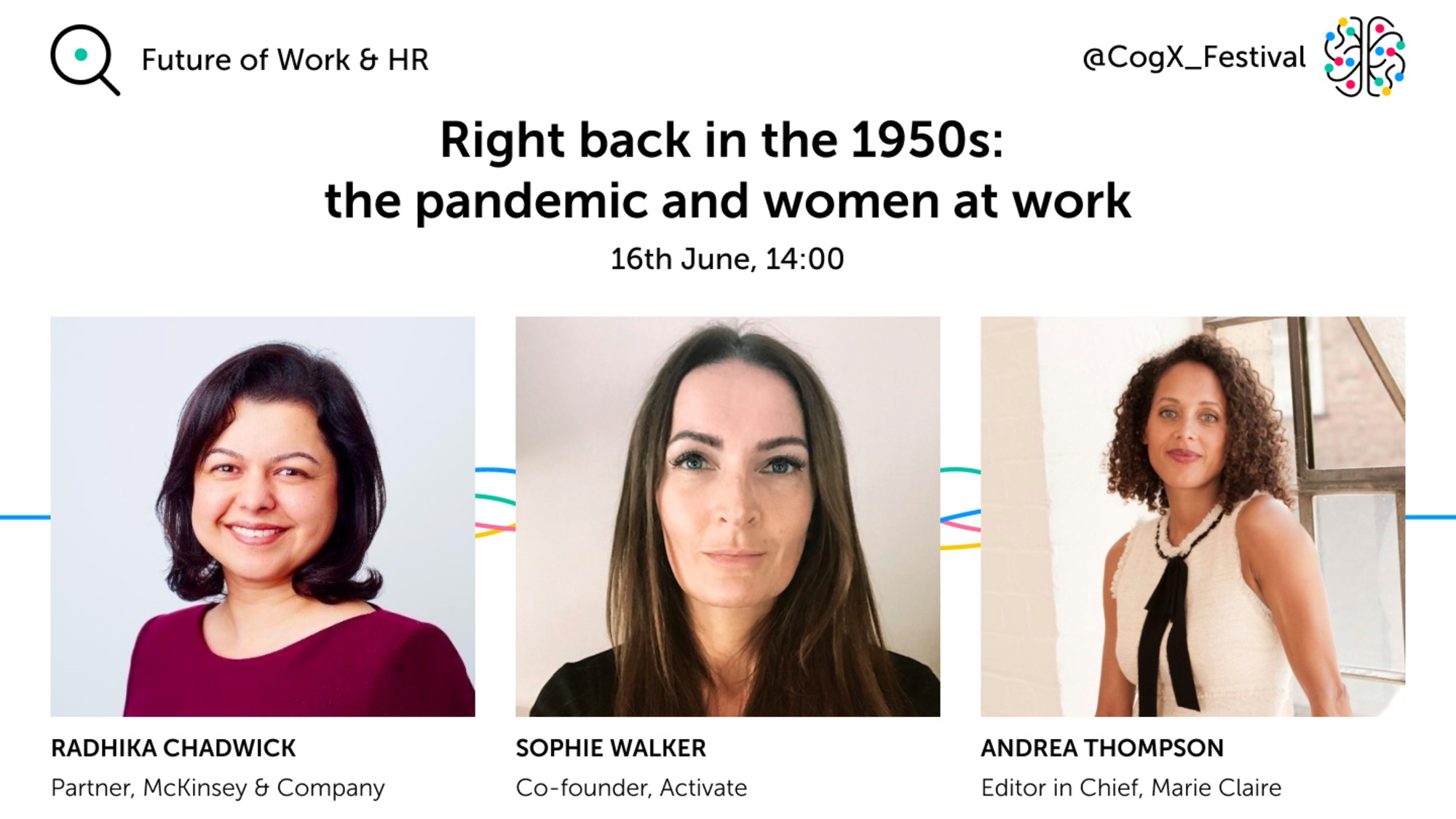Back to the 1950s: how the pandemic pushed back women's equality in the workplace
Fifteen months after the Covid 19 changed our working lives forever, Marie Claire's Editor in Chief Andrea Thompson joined CogX - the worlds biggest tech and leadership summit to discuss the punitive effects of the pandemic on gender equality plus how we put it right. Read on for the key take outs.

Celebrity news, beauty, fashion advice, and fascinating features, delivered straight to your inbox!
You are now subscribed
Your newsletter sign-up was successful
Fifteen months after the Covid 19 changed our working lives forever, Marie Claire's Editor in Chief Andrea Thompson joined CogX - the worlds biggest tech and leadership summit to discuss the punitive effects of the pandemic on gender equality plus how we put it right. Read on for the key take outs.
The devastating impact the pandemic has had on women's careers is something we at Marie Claire have been covering extensively over the past fifteen months.
As Marie Claire Editor-in-Chief Andrea Thompson reminded virtual attendees of this year's CogX Festival the situation is at a critical point. "According to UN women, the pandemic will push 47 million more women and girls below the poverty line, reversing decades of progress. Women were also more likely to lose their jobs in 17 of the 24 richest countries last year. And perhaps most worryingly of all is the fact that only 1 in 8 countries worldwide have measures in place to protect women from the social and economic fallout [of the coronavirus crisis]."
Thompson was chairing a panel on the subject of what governments and companies can do to tackle the crisis in a discussion that was hosted on the CogX virtual Future Of Work stage at the world's biggest tech and leadership summit. It can be viewed in full below.
Between lost livelihoods for the least well paid, escalating domestic burdens, and pressure to balance longer home working hours with full-time childcare, many hard-won gains in gender equality at work have been obliterated over the past year-and-a-half.
Which begs the question: have we wound up right back in the 1950s?
Yes and no, said Radhika Chadwick and Sophie Walker; two incredible women's equality advocates who joined Andrea on the virtual CogX stage to debate how a lack of female representation in government lead to policies that failed to take into considerations the needs of women from childcare issues to safety concerns over vaccinations and pregnancy. They also discussed the huge economic fall out of months of homeschooling which lead to 2 in 5 working mothers stepping back from work or considering doing so due to the stress of juggling caring responsibilities with their careers.
Celebrity news, beauty, fashion advice, and fascinating features, delivered straight to your inbox!
A partner in McKinsey’s London office, Radhika is a career technologist and strategist who’s spent twenty-five years helping large organisations and governments tackle complex strategic problems around policy, strategy, technology, and operations. Sophie, meanwhile, spent twenty years at Reuters as an international journalist before helping to form and lead the Women's Equality Party. A staunch advocate for investment in care, equal pay and an end to gender-based violence, she is the co-founder of Activate, a fund to help women from marginalised communities stand for political office.
If you missed the discussion you can watch it in full on the video above but we've also rounded up some of the key takeaways from their fascinating discussion at CogX 2021.
CogX 2021: Four things we learned about gender equality in our post-pandemic workplace

Women were hit hardest by Covid job losses – and it's mostly due to long-entrenched societal barriers
"Our research shows that while women account for 39 percent of the global workforce, we actually make up 54 percent of Covid job losses," Radhika told Andrea during the discussion on the final day of CogX 2021. "Which means that Covid-19 has made women 1.8 times more vulnerable to job loss than men. And frankly, this is coming after a period where we saw almost no progress in workplace gender equality."
Radhika noted that while these startling figures were in part due to women making up a larger portion of the industries worst affected by the pandemic (namely, retail and hospitality), the problem extends much further.
"Our analysis finds that one quarter of this difference can be explained by the fact that men and women tend to cluster in different occupations. Women are disproportionately represented in industries that have been hardest hit by Covid. But that’s only one quarter of the difference. The other three quarters of the difference relates to the societal barriers [that exist] for women at work – which basically means that we’re still more vulnerable because there are still gender inequalities."
We need more women policy makers to make more equal policies
"A lot of the policies made in parliament at the height of the pandemic have not been reflective of the whole nation," said Andrea.
"We need women policy makers, and I think that has been made abundantly clear by the government’s reaction to the pandemic in this country and other countries," agreed Sophie. "We’ve had an analysis of the 73 government meetings held in 2020 on the Covid crisis, and only 13 of them made any reference to gender.
"The less our politicians look like us, the less likely they are to act in our interests, and the more at risk our democracy becomes. And I think what we really need to push for now is working class women, disabled women, women of colour – all of whom are less likely to be seen and heard in political spaces, and even less likely to have power or influence over the policies and initiatives that are supposed to help them. We need to support them, listen to them, and we need to put money into it."
Technology presents opportunity for gender equality, but also a threat
"The opportunity," said Radhika, "is that in a post-pandemic world, 20 to 25 percent of our global workforce could be moving to remote working. That’s three to four times higher than pre-pandemic times. Anything that helps people work more flexibly (people who have caring responsibilities are disproportionately women) is a good thing.
"But the threat of course is that we still have a digital divide. Globally, women have 20% less access to the internet than men." How can companies tackle this? By identifying their problems, and acting fast. "If the data is saying [employees] are struggling without the right technology, then sort it out. If the data says women need flexible working, then put it in place now."
We must not go back to the way things were
"I think we need a work rebellion," said Sophie. "I think now is the time for women in particular to really move away from these very traditional, white, male capitalist templates towards more community cooperative work in the way that we figure out how to work and support each other. We should not be rushing to return to a 'normal' working framework that was not working for so many."
Added Radhika: “We’ve been talking about gender equality for a long time. It’s a complex problem, and a complex problem requires all aspects of society to stand up together. I think what would inspire me is if I saw business and political leaders working together to take some bold action that signals a genuine desire to move the needle. I’d like to see us doing something more, and doing it together."
"Let's not waste this vital opportunity to build back better when it comes to the Future of Work," added Thompson. "We are at a critical point where we have an opportunity to do things differently instead of as we always have, and embrace new humane ways of working that are better for women - and for business."
Kate McCusker is a freelance writer at Marie Claire UK, having joined the team in 2019. She studied fashion journalism at Central Saint Martins, and her byline has also appeared in Dezeen, British Vogue, The Times and woman&home. In no particular order, her big loves are: design, good fiction, bad reality shows and the risible interiors of celebrity houses.
